Feb. 13, 2017 – Last Friday was an extremely busy and productive day for the State Bar of Wisconsin’s Board of Governors, which convened at the State Bar Center in Madison to discuss and consider various proposals, including one from 54 retired judges.
The 52-member board, which directs State Bar policy and activities, began the day by adopting a statement that urged respect for an independent judiciary, then dove into a packed agenda that included discussions on the budget and various petitions.
Maryann Sumi and Sarah O’Brien, retired judges who signed the petition, appeared at the board meeting to explain the petitioners’ reasons for filing it with the supreme court.
Judge O’Brien said retired judges began discussing the issue at the 2015 Wisconsin Judicial Conference and, after a year of discussion, agreed to file the current petition.
“We are disturbed that in Wisconsin and across the country, citizens have come to believe that justice is for sale. And there are numerous surveys and polls that show that,” O’Brien said.
She said Wisconsin’s recusal rules have been widely criticized, in Wisconsin and beyond, as not adequately addressing perceived conflicts that exist when judges hear cases involving parties that have contributed large sums to their election campaigns.
Board members discussed the petition and asked questions but are not expected to take any action until April.
The board voted to support a pending petition that would allow lawyers to obtain up to six hours of continuing legal education (CLE) credit on the subject of law practice management, such as applications of technology, recordkeeping, or trust accounting.
Under the pending petition, lawyers could also receive up to six hours for courses designed to enhance a lawyer’s awareness and understanding of substance abuse or dependence disorders, mental illness, stress management, and work-life balance.
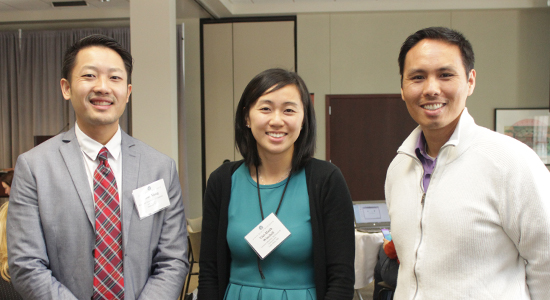
From left: Wisconsin Asian Bar Association Liaison Amesia Xiong, NRLD Representative Viet-Hanh Winchell, and State Bar Member Services Manager Jerry Vang.
The Board of Bar Examiners (BBE) filed the petition (16-06) with the Wisconsin Supreme Court in November 2016, and it will now move forward with the State Bar’s full support. BBE Director Jacquelynn Rothstein spoke on the petition at the board meeting.
The BBE is responsible for approving CLE course requirements. Rothstein said a BBE subcommittee formed to review the CLE issue determined that “expanding course offerings to include those course subjects would be beneficial to attorneys.”
The pending petition also expands the number of repeated “on demand” credits that lawyers can obtain. On-demand programs are online programs offered repeatedly on the internet. Currently, lawyers are limited to 10 “on-demand” credits per two-year reporting period. The proposal allows for 15 “on-demand” credits per period.
Board Supports Reciprocity Rule for Tribal Work
Attorneys who work for federally recognized Indian tribes would get credit for that work when it comes to Wisconsin’s waiver admission rule, under a petition the board voted to support. The Stockbridge-Munsee Community filed petition 16-09 in November 2016.
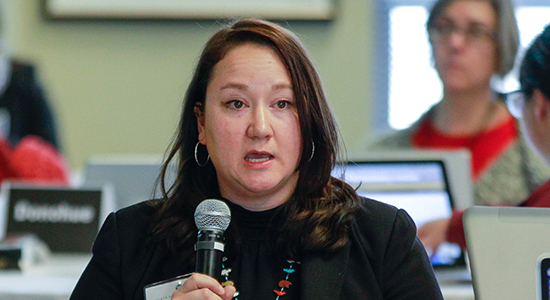
Native American Liaison Starlyn Rose Tourtillott speaks up on the reciprocity rule.
The petition requests an amendment to Supreme Court Rule (SCR) 40.05, which allows attorneys licensed in other states to gain admission to the practice of law in Wisconsin based on proof of practice. That is, lawyers can gain admission, without taking the bar exam, if they have been substantially engaged in the practice of law in another state or territory for three of the last five years. Work for the federal government counts.
Under the petition, the rule would expressly state that work for federally recognized Indian tribes also counts. Howard Bichler, the Indian Law Section’s liaison to the Board of Governors, said the Indian Law Section urged the board to support the petition.
Bichler said the petition was filed after the BBE denied Wisconsin admission to a Minnesota-licensed attorney who had been working for a federally recognized Indian tribe. The denial was based on the tribe’s status as a “foreign nation.”
A supporting memo to the petition notes that Wisconsin is an outlier on this issue and neighboring states recognize practice in federal Indian law as counting for reciprocity.
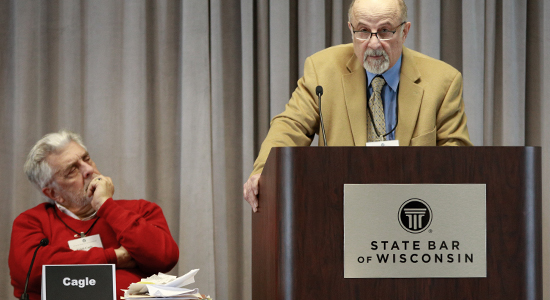
Board member Howard Bichler discusses the reciprocity rule petition related to tribal attorneys.
“This rule hinders our tribe and other tribes because the bar admittance system treats tribal attorneys differently compared to any other attorney,” the memo states. “This is not fair to those lawyers whose careers are dedicated to Federal Indian Law.”
Board Approves Next Executive Director
The board approved Larry Martin as the State Bar’s next executive director, officially starting in that capacity on July 1, 2017. Martin is currently the State Bar’s associate executive director. He will replace Executive Director George Brown, who is retiring.
Board Approves Appointment on Access to Justice Commission
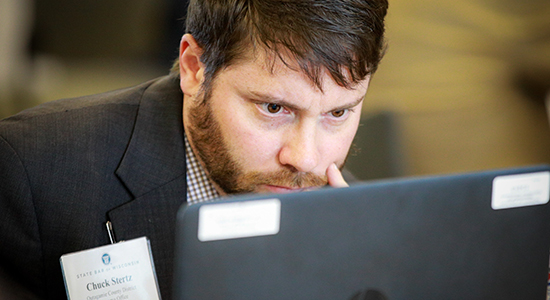
Board member Chuck Stertz studies the board materials.
The board approved State Bar President Fran Deisinger’s appointment to the Access to Justice Commission, which aids the courts in improving the administration of justice by supporting civil legal services. Milwaukee Circuit Court Judge Richard Sankovitz will succeed retired Appeals Court Judge Margaret Vergeront, who has resigned with more than a year remaining on her three-year term. Judge Sankovitz will serve out the term.
Board Approves KellerDues Reduction Amount
The board approved a “Keller dues rebate amount” of $7.75 for fiscal year 2018 (July 1, 2017 to June 30, 2018), which is $0.50 more than the rebate amount for FY 2017.
Under Supreme Court Rule 10.03(5)(b)1, the State Bar may not use compulsory dues of objecting members for activities that are “not necessarily or reasonably related to the purposes of regulating the legal profession or improving the quality of legal services.”
The State Bar must annually publish notice setting forth each member’s pro rata portion of dues that are not necessarily or reasonably related to these dual purposes. Members may elect to withhold the pro rata portion of nonchargeable dues on dues statements.
Nonchargeable dues are known as the “Keller dues rebate amount,” based on Keller v. State Bar of California, 496 U.S. 1 (1990). In Keller, the U.S. Supreme Court restricted the use of mandatory state bar dues to fund political or ideological activities unless germane to regulating the legal profession or improving the quality of legal services.
Board Discusses Proposed Budget for FY 2018
The board discussed a proposed budget for fiscal year 2018 (July 1, 2017 to June 30, 2018). The proposed budget funds $11.7 million dollars in operating expenditures with revenues that would include a $4 dues increase, up to $258 for active members.
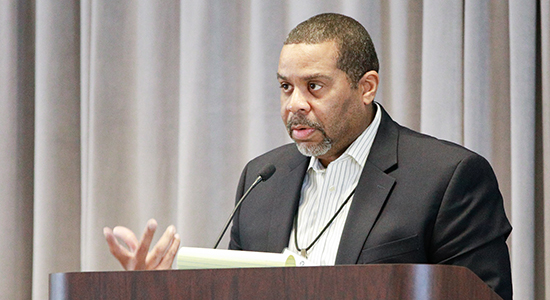
Board member Milton Childs delivers a report.
State Bar Treasurer John Danner, a member of the board’s Finance Committee, noted that a Dues Stabilization Fund would be tapped to replenish anticipated loss of revenue from an expected membership decline of 244 full dues-paying members.
Paul Marshall, the State Bar’s Finance Director, also noted that non-dues revenue streams such as PINNACLE remain flat and with reduced or minimal non-dues revenue, inflation becomes a budgeting challenge. Marshall noted that the budget includes $574,000 in expense cuts, including staff reorganizations that cut personnel expenses.
Marshall also stated that the State Bar has not added new programs and staffing levels have been slightly reduced, while cost containment has continued to guide the process.
Danner noted that the board’s Strategic Planning Committee is conducting a full inventory of State Bar activities that will inform the budgeting process moving forward.
“The Finance Committee came to the conclusion that it would be inappropriate to pick and choose things that we should eliminate without having completed that inventory,” Danner said. “When all is said and done, the budget calls for a $4 dues increase.”
Danner suggested a small dues increase was necessary now to avoid a much larger one five years down the road. Several members voiced concern with any proposal that raises dues. The board did not take action and will revisit the proposed budget in April.
Other Business
Paralegal Certification. The board again discussed a proposal to establish a voluntary certification program for Wisconsin paralegals, but took no action.
Amendments to State Bar Rules and Bylaws. The board discussed proposed revisions to the State Bar Rules and Bylaws, which have not been updated in 10 years.
Board approves Audit Committee Appointment. The board approved the appointment of Noah Fenceroy to replace James Quinn on the board’s Audit Committee. Quinn resigned his position on Nov. 3, 2016.
Upon request, interested members may obtain a copy of the minutes of each meeting of the Board of Governors. For more information, contact State Bar Executive Coordinator Jan Marks by email or by phone at (608) 250-6106.
